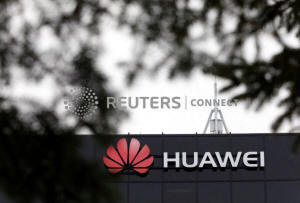|
U.S. legislation steps up pressure on
Huawei and ZTE, China calls it 'hysteria'
 Send a link to a friend
Send a link to a friend
 [January 17, 2019]
By Diane Bartz and Christian Shepherd [January 17, 2019]
By Diane Bartz and Christian Shepherd
WASHINGTON/BEIJING (Reuters) - A bipartisan
group of U.S. lawmakers introduced bills on Wednesday that would ban the
sale of U.S. chips or other components to Huawei Technologies Co Ltd [HWT.UL],
ZTE Corp or other Chinese telecommunications companies that violate U.S.
sanctions or export control laws.
The proposed law drew sharp criticism from China where Foreign Ministry
spokeswoman Hua Chunying called the U.S. legislation "hysteria",
intensifying a bitter trade war between Beijing and Washington.
The bills were introduced shortly before the Wall Street Journal
reported federal prosecutors were investigating allegations that Huawei
stole trade secrets from T-Mobile U.S. Inc and other U.S. businesses.
The Journal said that an indictment could be coming soon on allegations
that Huawei stole T-Mobile technology, called Tappy, which mimicked
human fingers and was used to test smartphones.

Huawei said in a statement the company and T-Mobile settled their
disputes in 2017 following a U.S. jury verdict that found "neither
damage, unjust enrichment nor wilful and malicious conduct by Huawei in
T-Mobile's trade secret claim".
Hua urged U.S. lawmakers to block the bills.
"I believe the action of these few representatives are an expression of
extreme arrogance and an extreme lack of self-confidence," Hua said.
"Actually the whole world can see very clearly that the real intent of
the United States is to employ its state apparatus in every conceivable
way to suppress and block out China's high-tech companies," she added.
The legislation is the latest in a long list of actions taken to fight
what some in the Trump administration call China's cheating through
intellectual property theft, illegal corporate subsidies and rules
hampering U.S. corporations that want to sell their goods in China.
PRESSURE MOUNTING
In November, the U.S. Department of Justice unveiled an initiative to
investigate China's trade practices with a goal of bringing trade secret
theft cases.
At that time, Washington had announced an indictment against Chinese
chipmaker Fujian Jinhua Integrated Circuit Co Ltd for stealing trade
secrets from U.S. semiconductor company Micron Technology relating to
research and development of memory storage devices.
Jinhua, which has denied any wrongdoing, was put on a list of entities
that cannot buy goods from U.S. firms.
On Capitol Hill, Senator Tom Cotton and Representative Mike Gallagher,
both Republicans, along with Senator Chris Van Hollen and Representative
Ruben Gallego, both Democrats, introduced the bills that would require
the president to ban the export of U.S. components to any Chinese
telecommunications company that violates U.S. sanctions or export
control laws.
[to top of second column]
|

The Huawei logo is pictured outside their research facility in
Ottawa, Ontario, Canada, December 6, 2018. REUTERS/Chris Wattie

The bills specifically cite ZTE and Huawei, both of which are viewed
with suspicion in the United States because of fears that their
switches and other gear could be used to spy on Americans. Both have
also been accused of failing to respect U.S. sanctions on Iran.
"Huawei is effectively an intelligence-gathering arm of the Chinese
Communist Party whose founder and CEO was an engineer for the
People's Liberation Army," Cotton wrote in a statement. "If Chinese
telecom companies like Huawei violate our sanctions or export
control laws, they should receive nothing less than the death
penalty - which this denial order would provide."
The proposed law and investigation are two of several challenges
that Huawei, the world's biggest telecommunications equipment maker,
faces in the U.S. market.
In addition to allegations of sanctions-busting and intellectual
property theft, Washington has been pressing allies to refrain from
buying Huawei's switches and other gear because of fears they will
be used by Beijing for espionage.
Huawei's founder, Ren Zhengfei, denied this week that his company
was used by the Chinese government to spy.
Canada detained Ren's daughter, Meng Wanzhou, who is Huawei's chief
financial officer, in December at the request of U.S. authorities
investigating an alleged scheme to use the global banking system to
evade U.S. sanctions against Iran.
For its part, ZTE agreed last year to pay a $1 billion fine to the
United States that had been imposed because the company breached a
U.S. embargo on trade with Iran.
As part of the agreement, the U.S. lifted a ban in place since April
that had prevented ZTE from buying the U.S. components it relies on
heavily to make smartphones and other devices.

(Reporting by Diane Bartz and Karen Freifeld; Additional reporting
by Anne Marie Roantree in HONG KONG and Christian Shepherd in
BEIJING; Editing by Steve Orlofsky, James Dalgleish, Leslie Adler,
Christopher Cushing and Darren Schuettler)
[© 2019 Thomson Reuters. All rights
reserved.]
Copyright 2019 Reuters. All rights reserved. This material may not be published,
broadcast, rewritten or redistributed.
Thompson Reuters is solely responsible for this content. |